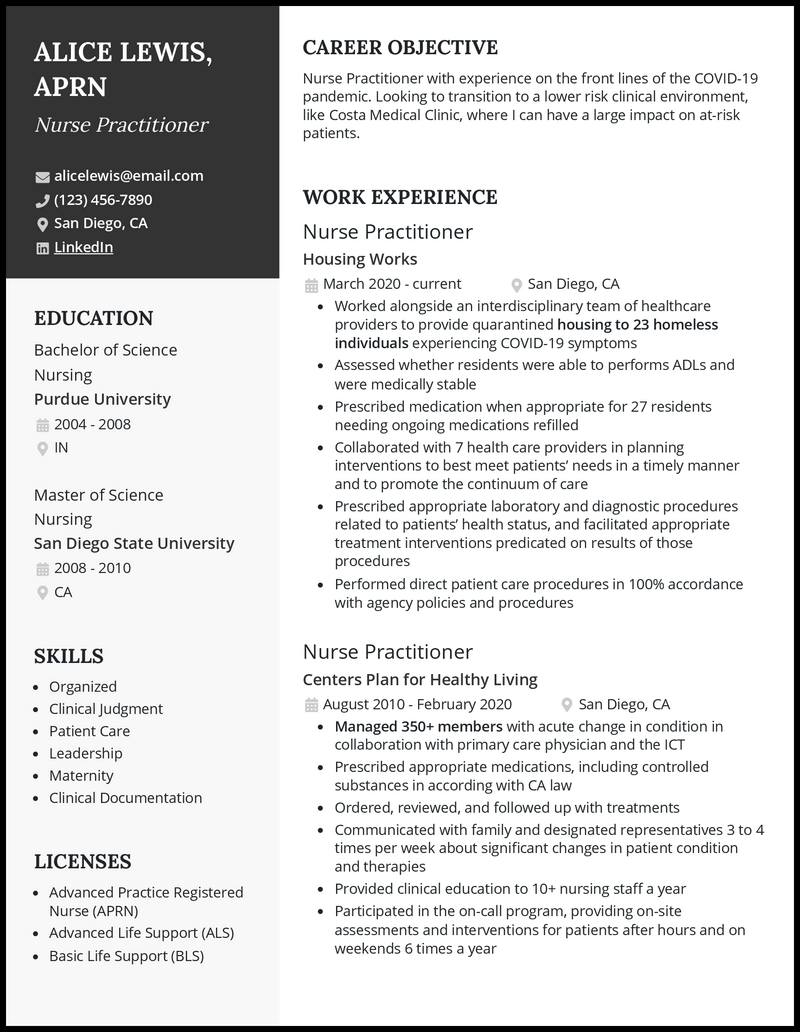As a nurse practitioner, you go the extra mile in patient care. Your additional education and nursing experience lets you use specific healthcare professional tools, such as autonomous diagnosis and treatment and medication prescription.
Sometimes, you lead a healthcare team. Other times, you conduct your research and help equip your colleagues with the knowledge they need to provide better care.
While you’re busy caring for patients, let us help you make a cover letter and the perfect resume. Get started on your journey toward your next role with our nurse practitioner resume examples.
Why this resume works
- Shh! We’ve got a case to solve here. How did this nurse practitioner resume make sure recruiters are left in awe? We’ve got hard evidence. It’s all hidden in the “lies”. We mean “li-censes”.
- Check out the advanced licenses Alice displays. Such documentation is undeniable proof that you’ve got what it takes to do the job. Next time you’re creating your own resume, level things up with those credentials.
Related resume examples
What Matters Most: Skills & Work Experience

Recruiters hiring nurse practitioners look for those who can strike the balance between highly technical, demanding work and an empathetic bedside manner.
You should demonstrate your proficiency in healthcare while also showing your ability to manage delicate situations between patients, family, and colleagues.
Here are some of the top skills recruiters are looking for in nurse practitioners.
9 Top Nurse Practitioner Skills
- Analytical skills
- CPR proficiency
- Differential diagnosis
- Injection administration
- Interpersonal skills
- Clinical interpretation
- Patient education skills
- Procedure development
- Triage code assessment
Sample Nurse Practitioner Work Experience Bullet Points
Nurse practitioners don’t just excel at providing healthcare, they also help bridge the gap between patients and healthcare professionals through education and research.
Using your work experience bullet points, recruiters understand how your expertise helped influence a better recovery environment at your facility. Adding quantifiable metrics to your resume will make it easier to visualize your past contributions.
Here are a few samples:
- Prescribed medication when appropriate for 27 residents needing ongoing medications refilled
- Collaborated with 7 healthcare providers in planning interventions to best meet patients’ needs promptly and to promote the continuum of care
- Performed direct patient care procedures in 100% accordance with agency policies and procedures
- Managed 350+ members with acute change in condition in collaboration with primary care physicians and the ICT
- Provided clinical education to 10+ nursing staff a year
Top 5 Tips For Your Nurse Practitioner Resume
- Pay attention to your resume formatting
- Just like how a medical report is written to quickly and efficiently get information across, your nurse practitioner resume should be the same. It should be reader-friendly with clear sections and a simple font. Make sure that there isn’t too much medical jargon in the bullet points, as it’s quite likely that a layperson will read it.
- If you’re including a resume objective or a resume summary, make it count
- Resume objectives are great for entry-level nurse practitioners, while resume summaries are better suited to experienced nurse practitioners. Here’s an ideal format: personal traits > education background > achievements. For extra oomph, add the company’s name, tell them how you’ll benefit the company, and back it up with quantifiable metrics.
- Tailor your resume to the job description
- We can’t stress this enough—your resume should be as relevant as possible to the position you’re applying for. If the nursing job description asks for a skill that you have, highlighting that skill will help your chances of getting employed. Even if you don’t have what they’re specifically looking for, mirroring the language used will let the recruiter know that you know what they need.
- If you’re an entry-level nurse practitioner, other relevant experience counts, too
- Sometimes, it feels like you have to have experience to gain experience. If you’re just starting out, you can add prior opportunities like internships, student practice, and voluntary work, as they also help demonstrate how your skills apply through your experience.
- Unless you have more than 10 years of experience, keep your resume to one page
- Long, convoluted medical reports can hamper the efforts of healthcare professionals—the same goes for your resume. Help recruiters stay focused on how well you fit the role by keeping your resume short, sweet, and to the point. Include only the information that’s most relevant to the job you’re going for.
How to Write a Nurse Practitioner Resume

- Pick the right resume template
As a nurse practitioner, you will be expected to hold various certifications, so pick a resume template that lets you include them all in a clearly visible section. Highlight your RN license that proves you’ve passed the NCLEX-RN exam, as well as the APRN certification and your state licensure. Don’t forget optional certifications that can make you stand out from the crowd, such as the FNP, ACNP, or PNP.
- Highlight your key strengths
Each role in nursing can vary greatly from the next, so be ready to adjust your resume based on the job description. This is especially important if your background aligns with the requirements of the job. For instance, if you’ve previously worked with kids and you’re applying to work as a PNP, update your resume to highlight that in your skills.
- Don’t sell yourself short
In your role, you touch many lives and help your patients regain tip-top health. Don’t sell yourself short by writing off your many accomplishments with non-descriptive work experience bullet points, such as “attended to patients.” Instead, really dig into what makes you an excellent NP and talk about your achievements, such as by saying: “Managed a caseload of 50+ chronic care patients, improving medication adherence by 18% through educational initiatives.”
- Own your work
Check your resume for active voice to clearly emphasize the role you’ve had in achieving positive outcomes for patients, whether reaching full recovery or an improvement in overall health. To make these points stand out, add some helpful metrics, such as how many patients you’ve worked with or how many diagnostic tests you’ve helped perform per month.
Nurse Practioner Resume FAQs

Nurse practitioners don’t just work in hospitals; they’re also found in facilities like community clinics, physicians’ offices, and nursing homes. In general, nurse practitioners usually work in community care, long-term care, hospitals, and NP-led clinics.
Nurse practitioners collaborate with other healthcare professionals within a healthcare setting, providing specialized services alongside a team that includes doctors, social workers, and registered nurses among others.
Yes, as the certifications and schooling you received will be important in determining whether you have the medical background necessary for the job. Adding any experience you acquired during your fellowship or residency will also help demonstrate the skills included in your resume (just like you see in our resume examples).












